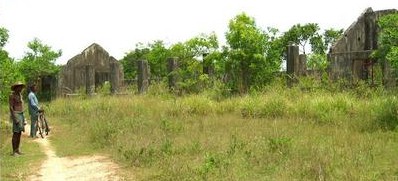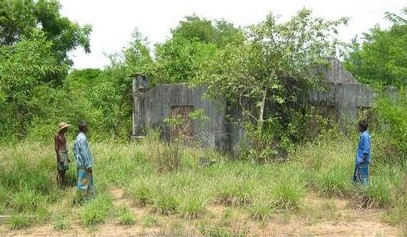Kannapuram
Massacre, 14 July 1990
TamilNet of 16 July 2003 on the Kannapuram Massacre
of 14 July 1990:
 "Kannapuram was one
of the most prosperous and rich agricultural villages
on Sri Lanka's east coast before it was ransacked and
destroyed by the Sri Lanka army (SLA) thirteen years
ago. Hundreds of refugees who are returning today to
reclaim their homes and paddy fields from the stubborn
clutches of the island's tropical forests face an
uncertain future - a military camp is firmly entrenched
in the midst of the village and no funds have been
granted so far by Colombo to help them resettle.
"Kannapuram was one
of the most prosperous and rich agricultural villages
on Sri Lanka's east coast before it was ransacked and
destroyed by the Sri Lanka army (SLA) thirteen years
ago. Hundreds of refugees who are returning today to
reclaim their homes and paddy fields from the stubborn
clutches of the island's tropical forests face an
uncertain future - a military camp is firmly entrenched
in the midst of the village and no funds have been
granted so far by Colombo to help them resettle.
Kannapuram was established as the 35th Colony in the
Gal Oya Irrigation Scheme around 1956. Tamils, mostly
from Thuraineelavanai, a village on an arid promontory
in the lagoon 35 kilometres south of Batticaloa,
settled here. Tamil farmers from Thuraineelavanai and
other villages in the southern parts of Batticaloa also
settled in the adjacent 37th, 38th, 39th and 40th
colonies. Singhalese were settled in the 34th and 36th
colonies. Each settler was granted three acres of paddy
land and half an acre of high land for building
homesteads.
Tamil politicians have charged that the Sinhala
colonies were established on lands which traditionally
belonged to the people of Batticaloa as pasture for
their large cattle and buffalo herds and as virgin
forest in which they had carried on slash and burn
agriculture from ancient times.They argued that the
colonized hinterland was ecologically vital for the
long-term sustenance of agriculture and inland
fisheries on which most of the Batticaloa district's
population was dependent for its survival.
"During the day, on 14 July 1990, we heard that the
army was moving into our village. We were having our
meal. I did not have time to even wash my hand as my
family dragged me and ran for its life, fearing certain
death at the hands of the invading soldiers. I was six
years old then", Ms. Surejini Narayanamoorthy, 19, who
survived the destruction in Kannapuram thirteen years
ago, told TamilNet.
Ms. Surejini is a widow. She has a child. The girl was
in Kannapuram Tuesday with her father to clear the
dense undergrowth in what was once their farm and
homestead.
"Some people came back a few days after the army
invasion to retrieve whatever belongings that may have
been spared by the marauding soldiers. They saw the
bodies of those who stayed behind, chopped up and
thrown in our water wells. Some old men and women were
burnt inside the houses in which they had decided to
stay, braving the army", said Ms. Komalathevi Ranjan,
36, mother of five.
She too had come to Kannapuram to clear the
undergrowth in her property. "The Sri Lanka army troops
and the Singhalese who came with them ransacked our
homes and took away all our belongings. We left
everything behind as we ran for our lives that day.
They demolished our houses and took away even rafters,
roof tiles, doors, door and window frames", Mr.
Kaalimuththu Wimalanathan, 40, a farmer who has
returned to cultivate his paddy field.
|

Remains of Village School in 2003
|
The Sri Lanka army was pulled out from the area in
early 1991. The STF has been in charge of controlling
the area since then.
Wimalanathan lives as a refugee in Paalaiyadivettai,
a village 3 kilometres east of Kannapuram. The Special
Task Force (STF), the elite counter insurgency arm of
the Sri Lankan armed, is encamped in properties
adjacent to his home in Kannapuram.
"We are unable to go back to our home because our
property is too close the camp," he laments. The STF
occupies seven homesteads in Kannapuram. All homes
here, except one, were razed to the ground by the Sri
Lanka army, which first set up a camp here in 1991. The
surviving home is the camp's headquarters now.
More than fifteen displaced families will not be able
to resettle in their homes until the STF permanently
vacates the camp in the midst of Kannapuram.

Derelict Kannapuram Dispensary
in 2003 |
The village's school, dispensary and co-operative
society building are in ruins, their remains fast
falling prey to the rising tide of the jungle. Only the
bombed out walls of the large facilities for storing
the big bi-annual rice harvests in the area are visible
today amid the foliage.
The temple of Kannapuram and its bell tower, built
by a picturesque hillock, stand derelict. "The army
took away the assistant priest who came to re-open the
temple after the military operations were believed to
be over. He disappeared. We think he was tortured and
killed by the soldiers", said Mr. Kandaiah
Balasundaram, treasurer of the local Rural Development
Society (RDS). The area's prosperity derives largely
from the minor rivers that skirt it, being the
effluence of the Navakkiri Reservoir, northwest of
Kannapuram, closer to the Sinhala border. The causeway
over these rivers was blasted by the SLA thirteen years
ago and is yet to be repaired.
"The STF was encamped at the Vattavithanai Junction,
another key point in the village. The place was
dismantled in 1996 but lethal mines were left behind
the STF there. Two persons who visited their home at
this junction were killed in a booby trap explosion.
The devise was left behind by the STF when it vacated
that home", Mr. Wimalanathan said.